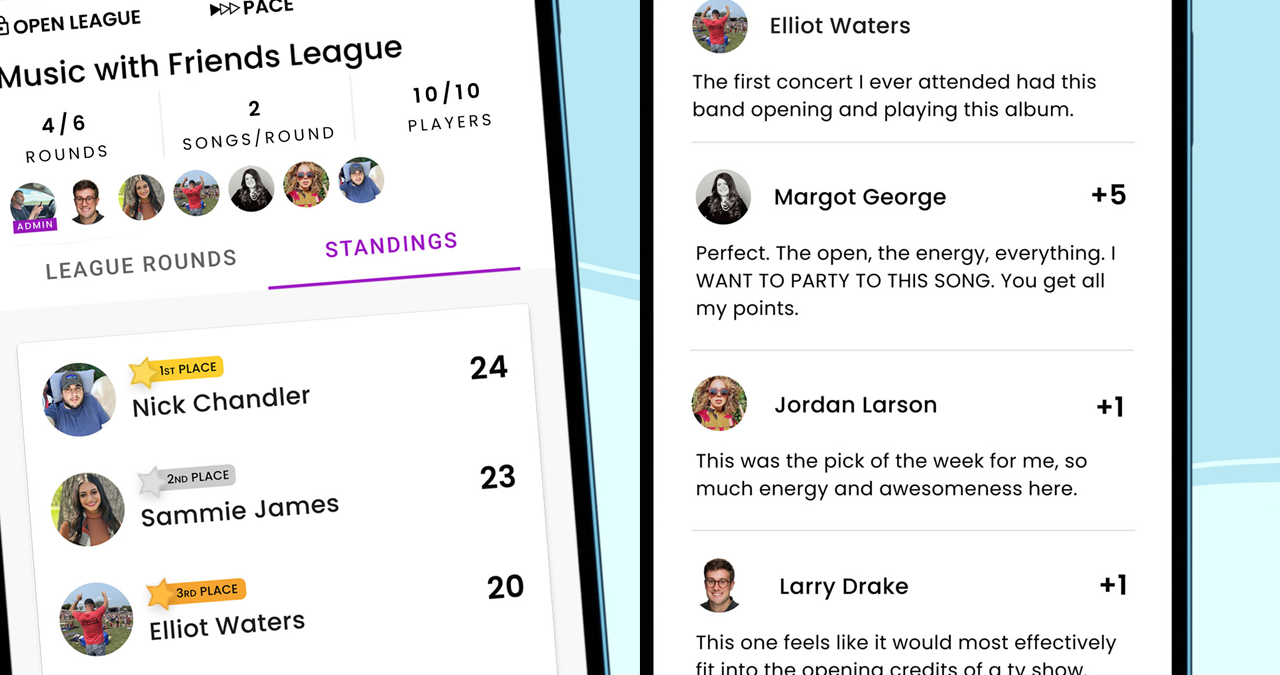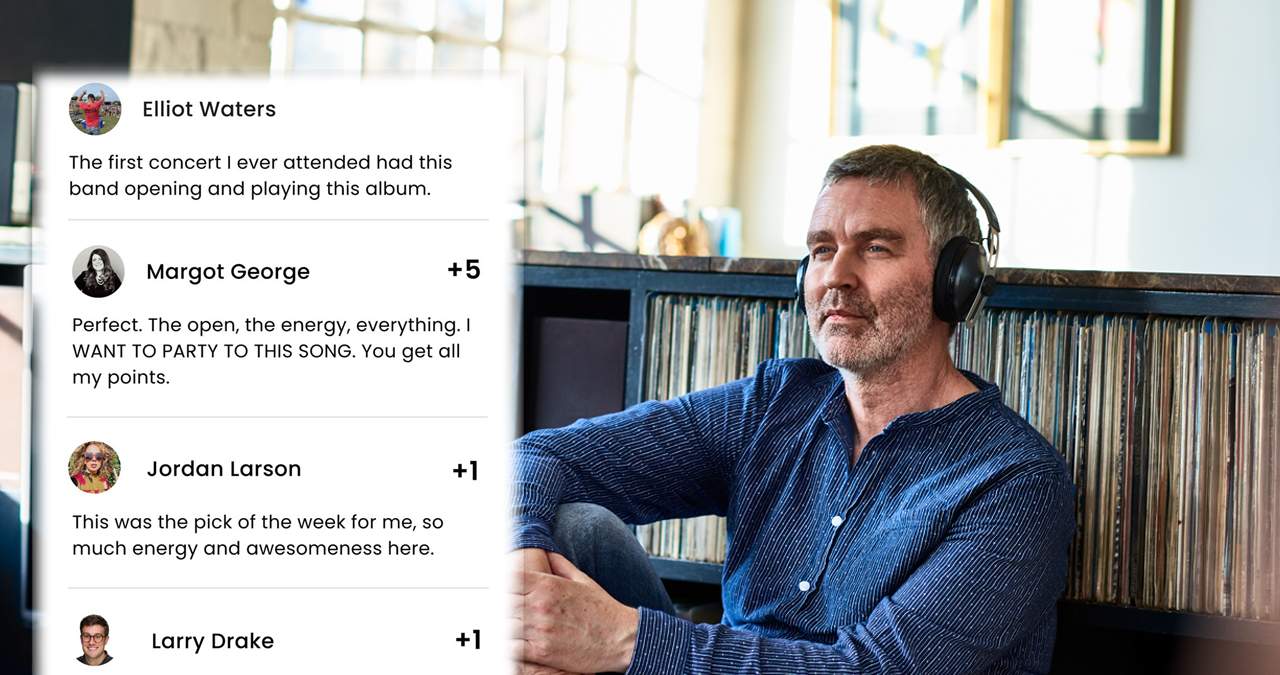“Algorithms have sort of turned every playlist into grocery store background music”: We speak to the maker of a game putting the humanity back into music discovery
Music League lets players discover and vote on music via a fantasy sports-aping model - and it’s already got thousands of daily players

Want all the hottest music and gear news, reviews, deals, features and more, direct to your inbox? Sign up here.
You are now subscribed
Your newsletter sign-up was successful
It’s an odd paradox in 2025, that with the sheer quantity of music at our disposal, the formerly magical process of music discovery has been quietly neutered.
Though algorithm and AI-driven suggestions might feel helpful for shunting us towards artists that our listening behaviour believes we should like, many of us have started to feel increasingly locked away in these personal silos.
It's especially isolating for those for whom music was always an inherently social passion.
Aiming to put the humanity back into music discovery comes Music League. An app or browser-based game that allows users to get into select groups with friends - or strangers - and participate in various self-constructed rounds.
These rounds consist of players submitting songs that fit a particular theme (i.e - ‘songs with a killer guitar solo’, or ’the best songs written for a film soundtrack’). The kinds of things that you and your music-obsessed friends would typically converse about at a bar.
Essentially then - you're all building out a playlist which is then distributed around participants.
Participants then get the option to vote on which track best fits the theme (or simply vote in terms of quality) and add comments to each track.
The more points your track has - the more points you have as the various rounds progress until the league is completed and a winner is crowned.
It sounds fairly simple, but the direct appeal of Music League could be the perfect antidote to anonymous platform-curated playlist creation.
It also sounds like fantastic music conversation-starter - something that has seemingly slid out of the daily lives of many.
To find out more, and dig into what further applications Music League could have, we spoke with founder Eric West.
Want all the hottest music and gear news, reviews, deals, features and more, direct to your inbox? Sign up here.
MusicRadar: Hi Eric, firstly can you talk us through Music League and what the motivation was to design such an experience?
Eric West: It actually started amongst a group of co-workers who were having that age-old argument about who had the best taste in music, who had discovered that band first, who made the best playlists - as people tend to do.
So it was those people who created the bedrock of the game, which then evolved into what Music League is today.
I came along [a bit later] on the business side a few years after that. I decided to build a business around it and develop the mobile apps, and then a [refined] version of the web app.
I came to it because I really loved the concept. Even today, I don’t think there’s a unique music discovery platform anywhere [like this] that brings the human element back into it.
Ideally you’ll play with friends, family or co-workers - but we’ve also had a lot of uptake on the open leagues where you’re playing with strangers.
MR: It definitely seems like a good counter to the modern, algorithmically-driven discovery experience of music streaming. I guess that’s a downside of having everything on-tap. This seems to facilitate actual conversation around songs…
EW: Yeah. Of course it’s a great way to discover new music. It breaks through the algorithm and lessens the noise of having a billion tracks that you can access narrowed down to 10, 12 or 15.
It also drives ‘intentional’ listening.
People are so used to pushing play on their Spotify playlists which often just run in the background for many people. Maybe some listeners are really tuned in, if they’re searching for an artist or a particular playlist to match whatever mood they’re in at that point then they’re certainly more likely to listen intently.
With Music League, it’s almost like when you’d get a text from a friend saying ‘hey, you’ve got to check out this band’. You then listen to a band because your friend told you to do it.
Music League is like an entire playlist of friends telling you to listen to this band (or song). And you do it because you also want to play the game, and be fair about it.
Players want to vote accordingly and with comments - they want to show [they’re engaged] and put heart into their thoughts.
It’s a really good way of not just being exposed to new music - but to actually listen to it, talk about it and debate it to decide who has the best taste in music.

MR: Do you think passive streaming consumption is playing a part in sapping music’s power and culturally-central status?
EW: I think it’s key to differentiate ‘listening’ vs ‘consuming’. But how do you define that difference?
People consume [music] all the time, like when you’re out shopping at a grocery store. You’re hearing the music [on their speakers] but not really listening.
I feel like algorithms have sort of turned every playlist into grocery store background music.
At the same time, I do listen to those kinds of ‘mood’-based playlists - if I can’t find a Music League playlist to match it in that moment. So, they do have their purpose.
But I genuinely don’t think there’s a better way to discover music than this platform.
MR: What are some of the most fun ways to play Music League?
EW: There’s two paths to play. One is - we say - that there’s a parallel with fantasy sports. And that’s that you play it when it’s convenient. Though you do have a deadline to take action.
But the action is either to submit a song or vote on songs, and you play generally with people close to you. You all have respect for the songs and for the people that are playing - you respect their musical tastes.
So the playlists being generated are presumably pretty good, or at least you're motivated to listen to them [actively].
The open leagues are similar in the way that the leagues are made up and the cadence of play. The difference is, generally speaking, you’re not going to know who you’re playing with.
In a lot of ways, I think that’s probably a strong music discovery tool than playing with friends and family. Because, you know, playing with people you know might risk having some quite homogenous tastes.
If you’re friends already, there’s a pretty good chance you’ll share musical tastes already. Yet in the open leagues, it’s just wide open.
You might scroll through the lists and look for a genre, a league that revolves around a genre that you like - but then you’ll be playing with people from all over the world.
About 60% of our market is US-based, so more than likely you’ll end up playing someone in the US, but up to 10% is UK. I play with people from the UK quite a bit!
The social component of this is something I love. You’ll find people who like the same obscure band that you didn’t think anybody else liked.
They’ll put a song into a playlist and it’ll just blow your mind - because you thought for sure you’re the only person who liked that band.
All of a sudden you’ve made a friend who also likes that band.
We want to really lean into that. You loved playing with that person, and you want to play with them again, talk and just have an online chat and get to know them.
We want people to be able to do that more easily, so they can find their tribes. You can find people who love the same niches.
The more you submit songs in various leagues throughout the world, the more people you’re going to realise also like that band. We could kind of develop a community around a band or an individual artist - or even obscure genre - which is really exciting.

MR: That’s interesting that you mention obscure bands. I was wondering whether there could be applications of ML that would be useful for new bands and artists, trying to get heard and audience build?
EW: We certainly hope so.
Perhaps when there’s a big enough group of fans of an ‘obscure’ (or unsigned) artist, one of them could reach out to the band and invite them [to participate] or say hello.
They could maybe play a round or two with some of their fans in a very public way, and all the fans are watching the league unfold.
I know artists are pretty tired of being forced to make content that isn’t music. I’d be annoyed too.
I think what separates this is that it’s a game that people can enjoy playing which could also [give insight] into the band or artist.
Artists could create themes that are like ‘songs that inspired our first album’ - the kinds of stuff that fans just eat up.
Artists aren’t being interviewed or forced to write any long-form response - they just submit a song. Fans are going to engage with that band and listen to their playlists.
There’s all kinds of ways for the industry to get into Music League and use it, without corrupting it.
MR: So is that fan-building aspect - the social side - something you’re going to push further as Music League develops?
EW: Yes, we need to raise a little bit of money - not too much - to help us build some new features that lean into that social component.
Social music has been a tough nut to crack - and I’m not saying that we’ve found the magic formula, but I think we’re closer than most have got. We’re coming at it from the angle where there’s actually something to do. There’s a fun game to play, and it just happens to revolve around the discovery of music. I feel like we’re on to something.
We’re going to iterate based on audience and industry feedback.
MR: Music League uses Spotify as its library source - could Music League be integrated more directly into Spotify down the line perhaps?
EW: There's not been direct discussions about anything beyond what we're currently doing.
We are certainly aware that Spotify doesn't have a sterling reputation, and I think some of that's unfair, but we're aware of that. And, they have the largest catalogue and biggest user-base. It just makes sense to work with them, and they’re kind enough to allow it.
MR: What are your current objectives as a business?
EW: We've been very lucky in that our fans love this product, and they're the ones who have spread the word for us. Then a chunk of those new users turn around and do the same thing.
That’s [led to] some very organic growth all through word of mouth.
I think our focus is more on enhancing the current experience, adding some features that we would love to see in the game.
We hear fairly regularly from our users that there's five or six features that are really kind of the most obvious things for us to build in. And we're excited to do that.
MR: We haven’t really seen anyone else doing anything like what you’re doing. Do you think you’ve carved out a new niche for music discovery for music fans?
EW: I certainly hope that we’ve tapped into something that will last and is unique.
I’ve not seen anything like it either.
I think one of the most appealing things about it is the ability to get that dopamine hit of somebody saying ‘You’re right - I love this band! Thank you for exposing me to them’. It really feels good you know.
I think there’s a real chemical reaction to getting that validation from somebody.
Then on the other end, if you’re a kid and your mum has been telling you your whole life that you should check out the Beatles, but you’re reluctant to listen until you’re exposed to them via Music League. Then you realise you love them. There’s a big generational [communication] component.
And vice-versa, that kid could be nagging their mum to check out Skrillex - and she’d not be interested. But then, lo and behold, your mum’s listening to Skrillex in Music League. It’s a great route for people to discover music in every direction that they never would have otherwise.
For more information on Music League, and to download the app, head over to the official website.

I'm Andy, the Music-Making Ed here at MusicRadar. My work explores the inner-workings of how music is made and frequently digs into the history and development of popular music.
Previously the editor of Computer Music, my career has included editing MusicTech magazine and website and writing about music-making and listening for a range of titles including NME, Classic Pop, Audio Media International, Guitar.com and Uncut.
When I'm not writing about music, I'm making it. I release tracks under the name ALP.
You must confirm your public display name before commenting
Please logout and then login again, you will then be prompted to enter your display name.
